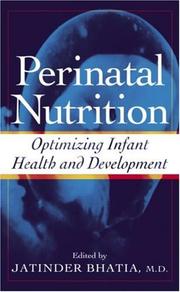| Listing 1 - 3 of 3 |
Sort by
|

ISBN: 0824754743 Year: 2005 Publisher: New York (N.Y.) Dekker
Abstract | Keywords | Export | Availability | Bookmark
 Loading...
Loading...Choose an application
- Reference Manager
- EndNote
- RefWorks (Direct export to RefWorks)
Book
ISBN: 1283143771 9786613143778 9814280054 9789814280044 9814280046 9789814280051 9781283143776 6613143774 Year: 2011 Publisher: New Jersey World Scientific
Abstract | Keywords | Export | Availability | Bookmark
 Loading...
Loading...Choose an application
- Reference Manager
- EndNote
- RefWorks (Direct export to RefWorks)
Innovations in technology and new therapies have changed the face of medicine in the last few decades. These include advances in fetal diagnosis (preimplantation genetics, chorionic villous sampling and amniocentesis), drugs that have been developed to treat unique conditions in neonates such as respiratory distress syndrome (surfactant) and pulmonary hypertension (inhaled nitric oxide), as well as technological advances and interventions resulting in diagnostic (ultrasounds and MRI) and therapeutic interventions (intrauterine transfusion to ECMO). Research in fertility treatments have resulte
Newborn infants --- Fetus --- Perinatology. --- Neonatology. --- Medical care. --- Diseases.
Book

ISBN: 9783318026900 Year: 2015 Publisher: Basel : Karger,
Abstract | Keywords | Export | Availability | Bookmark
 Loading...
Loading...Choose an application
- Reference Manager
- EndNote
- RefWorks (Direct export to RefWorks)
There is no other time in life when the provision of adequate and balanced nutrition is of greater importance than during infancy and childhood. During this dynamic phase characterized by rapid growth, development and developmental plasticity, a sufficient amount and appropriate composition of nutrients both in health and disease are of key importance for growth, functional outcomes such as cognition and immune response, and the metabolic programming of long-term health and well-being. This compact reference text provides concise information to readers who seek quick guidance on practical issues in the nutrition of infants, children and adolescents. After the success of the first edition, which sold more than 50'000 copies in several languages, the editors prepared this thoroughly revised and updated second edition which focuses again on nutritional challenges in both affluent and poor populations around the world. Serving as a practical reference guide, this book will contribute to further improving the quality of feeding of healthy infants and children, as well as enhancing the standards of nutritional care in sick children.
| Listing 1 - 3 of 3 |
Sort by
|

 Search
Search Feedback
Feedback About UniCat
About UniCat  Help
Help News
News